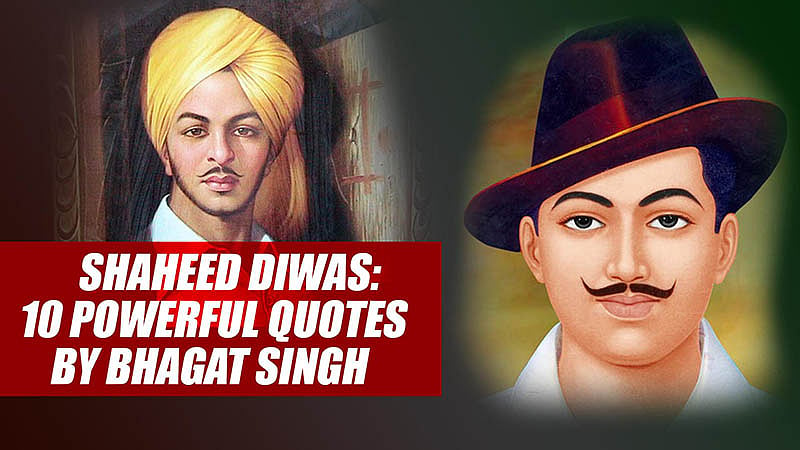The youth hero and flag-bearer of revolution, Bhagat Singh remains in the memories of Indians vividly even after 88 years of his execution. The 23-year-old martyr is written down in history and represented in films, his story is told and retold in books and through plays; his words ‘Inquilab Zindabad’ are etched in the minds and hearts of millions of Indians for the unshaken courage and will he had to free India from the British rule.
Bhagat Singh was born in a politically aware family that followed Gandhi. Bhagat Singh burnt the books received by the British government as a part of the non-cooperation movement and enrolled in the National College in Lahore.
The Jallianwala Baug massacre and the ruthless killing of the unarmed Akali protesters at the Nankana Sahib in 1921 deeply moved him. He distanced himself from Gandhi’s non-violent approach after the Chauri Chaura incident in 1922 and aligned himself with the Young Revolutionary Movement. He then advocated violence as morally justifiable for the cause of freedom.
Force when aggressively applied is "violence" and is, therefore, morally unjustifiable, but when it is used in the furtherance of a legitimate cause, it has its moral justification. The elimination of force at all costs is Utopian.
Bhagat Singh
Bhagat Singh wrote multiple thought pieces in Indian newspapers under various pen-names. His thoughts awakened the need to revolt against the British-raj amongst the youth of India. He became popular amongst the youth and a person of interest for the British government. The death of Lala Lajpat Rai was what initiated Bhagat Singh’s path to his execution.
Lala Lajpat Rai had succumbed to the injuries he suffered at the hand of British police in a protest against the Simon Commission. Bhagat Singh planned to kill the Superintendent of Police who ordered lathi-charge at the protestors as revenge for Lala Lajpat Rai’s death. However, Bhagat Singh and his associates ended up killing the Assistant Superintendent of Police by mistake and went into hiding. He shaved off his bear and cut short his hair to avoid his arrest for the killing of the Assistant Superintendent.
People get accustomed to the established order of things and tremble at the idea of change. It is this lethargic spirit that needs be replaced by the revolutionary spirit.
Bhagat Singh
In 1929, Bhagat Singh resurfaced, and only later it was understood that he didn’t want to escape that time. To protest the formulation of the Defence of India Act, he along with Batukeshwar Dutt bombed the assembly premises where the ordinance was in motion. The blast was not meant to harm anyone but further the revolution, both Bhagat Singh and Batukeshwar Dutt surrendered later.
A trial started against Bhagat Singh and others accused in July 2929. Bhagat Singh had decided to defend himself. Bhagat Singh also led a hunger strike with his associated against the discrimination he witnessed between white and native Indian prisoners, and not being treated as political prisoners.
On the 7th of October 1930, the tribunal submitted a 300- pages long judgement that declared Bhagat Singh and his associates Sukhdev and Rajguru as guilty in the murder of the Assistant Superintendent of Police. To be hanged to death was the punishment ordered to them.
In 1931, on the 23rd of March at 7.30 in the morning, Singh, Sukhdev and Rajguru faced their punishment while chanting ‘Inquilab Zindabad’ and ‘Down with British Imperialism’.
They may kill me, but they cannot kill my ideas. They can crush my body, but they will not be able to crush my spirit.
Bhagat Singh
Bhagat Singh and his associates’ execution somewhat changed the face of the freedom struggle amongst youth and radical freedom fighters. Post-independence, Bhagat Singh’s life had a strong influence on the entertainment industry. Prominent Bollywood actors played Bhagat Singh in several movies on his life as a freedom fighter. School plays on Independence day brought alive Bhagat Singh’s story for kids. His quotes on revolution and freedom still strike a chord with the youth, and therefore even today, his legend lives on.









